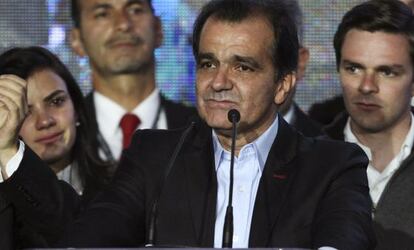Colombian election result leaves Uribe party on the sidelines
Seven million votes endorse Zuluaga as the main opposition leader

It only took an hour for the smile that had been plastered over Óscar Iván Zuluaga’s face to disappear. He had been smiling since he won the first round of Colombia’s presidential elections in late May. On Sunday, his followers – gathered at a hotel in downtown Bogota – tried to raise morale by waving their shirts in the air to cover up the unexpected defeat. Zuluaga addressed the crowd as his wife Marta Ligia and his children stood by him. He said he was grateful and spoke “without any hatred or resentment,” after congratulating President Juan Manuel Santos on his victory. “This is what democracy is about,” he added.
Zuluaga gave a short speech during which he only raised his voice to say that he was proud of having been the candidate for the Democratic Center Party. He expressed his immense gratitude to his mentor, former President Álvaro Uribe (2002-10). “He and his family made every physical effort to join me in this fight,” he said while his followers screamed “Zuluaga! Zuluaga!”
The former presidential candidate said his seven million votes have made his party a viable political alternative for Colombia after it faced down the entire “state machinery.” The now opposition leader said the fight would continue and that these votes would allow the party to carry “the opinion of the people who want peace negotiations based on certain conditions, the demands of rural workers, and of every region in Colombia, a voice that the government will listen to.”
Zuluaga said his seven million votes made his party a viable political alternative for Colombia
Shortly before, Martha Lucía Ramírez, the former Conservative Party presidential candidate who endorsed Zuluaga after his triumph in the first round, said the campaign “had been very uneven.” She insisted that negotiations with the FARC [Revolutionary Armed Forces of Colombia] needed to be tied to certain conditions: “with no recruitment of children, or terrorist attacks on civil population.” Ramírez asked President Santos to draw up “a bill to establish clear statutes for the opposition... so that the rules will be democratic and transparent.”
Carlo Holmes Trujillo, Zuluaga’s running mate, spoke in a stern voice to reiterate the Uribe camp’s insistence on a peace process without impunity. Those seven million Colombians voted for “a just peace,” he said. “They voted for peace without political participation for the FARC, those responsible for genocides and war crimes. They voted for holding discussions as long as the FARC is not killing, murdering, and blowing up Colombian infrastructure.”
Despite the defeat, Zuluaga has gained the political capital to set himself up as the main opposition leader for the next four years of the Santos administration. It also puts him first in line for the 2018 elections. With 20 seats in the Senate and 16 in the House of Representatives, Zuluaga stands as the most important voice in the opposition.
Translation: Dyane Jean François
Tu suscripción se está usando en otro dispositivo
¿Quieres añadir otro usuario a tu suscripción?
Si continúas leyendo en este dispositivo, no se podrá leer en el otro.
FlechaTu suscripción se está usando en otro dispositivo y solo puedes acceder a EL PAÍS desde un dispositivo a la vez.
Si quieres compartir tu cuenta, cambia tu suscripción a la modalidad Premium, así podrás añadir otro usuario. Cada uno accederá con su propia cuenta de email, lo que os permitirá personalizar vuestra experiencia en EL PAÍS.
En el caso de no saber quién está usando tu cuenta, te recomendamos cambiar tu contraseña aquí.
Si decides continuar compartiendo tu cuenta, este mensaje se mostrará en tu dispositivo y en el de la otra persona que está usando tu cuenta de forma indefinida, afectando a tu experiencia de lectura. Puedes consultar aquí los términos y condiciones de la suscripción digital.








































